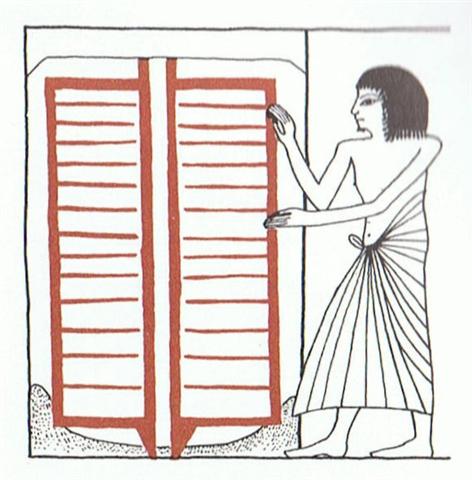There are 3 Tucana stars before 23h, viz. also δ and ν:
"The letter is based on a glyph of the Middle Bronze Age alphabets, probably called dalt 'door' (door in Modern Hebrew is delet), ultimately based on a hieroglyph depicting a door ..." (Wikipedia)
In this picture we can count 2 * 13 'ribs' in the door placed in the middle between what may be a pair of mountains. The pieces of cloth in the figure at right can be counted as 20. But then the central doors perhaps should be recounted as 2 * 14 = 28 'door cracks' (vaha papare), which together with 20 could become 48 (= 336 / 7). 336 = 140 (= 7 * 20) + 196 (= 14 * 14).
In modern Greek there are 24 letters with δ as number 4. When these 24 are divided by 2 the first letter in the 2nd half will be ν, a letter which has its origin in Phoenician nun: "Nun is thought to have come from a pictogram of a snake (the Hebrew word for snake, nachash begins with a Nun and snake in Aramaic is nun) or eel. Some have hypothesized a hieroglyph of a fish in water for its origin (in Arabic, nūn means large fish or whale). The Phoenician letter was named nūn 'fish', but the glyph has been suggested to descend from a hypothetical Proto-Canaanite nahš 'snake', based on the name in Ethiopic, ultimately from a hieroglyph representing a snake ...
... Nahš in modern Arabic literally means 'bad luck'. The cognate letter in Ge'ez and descended Semitic languages of Ethiopia is nehas, which also means 'brass'." (Wikipedia) 13 (= 24 / 2 + 1) is an unlucky number and ν is the 13th Greek letter. Beyond 'the corner' at 8 weeks (February 25) bad times could be looming ahead. In the night Pollux culminated. ... In the morning of the world, there was nothing but water. The Loon was calling, and the old man who at that time bore the Raven's name, Nangkilstlas, asked her why. 'The gods are homeless', the Loon replied. 'I'll see to it', said the old man, without moving from the fire in his house on the floor of the sea ...
 "Loon² ... name of various aquatic birds, XVII. prob. alteration of loom guillemot, etc. (XVII) - ON. lómr." "Loom² ... (orig. naut.) move slowly up and down; appear indistinctly. XVI. prob. of LDu. origin; cf. EFris. lōmen (whence Sw. dial. loma) move slowly, rel. to MHG. lüemen be weary, f. lüeme, slack, soft." (The Oxford Dictionary of English Etymology.) |





